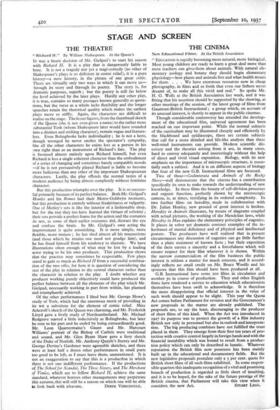STAGE AND SCREEN
THE THEATRE
"Richard II." By William Shakespeare. At the Queen's
IT was a brave decision of Mr. Gielgud's to start his season with Richard II. It is a play that is dangerously liable to bore. It is not a tragedy nor yet a tragi-comedy (no other of Shakespeare's plays is so deficient in comic relief), it is a pure history—a mere history, in the phrase of one great critic.
There are virtually only two ways in which it can move us— through its story and through its poetry. The story is, for dramatic purposes, superb ; but the poetry is still far below the level achieved by the later plays. Hardly any other play, it is true, contains so many passages known generally as quota- tions, but the verse as a whole lacks flexibility and the longer speeches retain the rhetorical quality which makes the earliest plays move so stiffly. Again, the characters are difficult to realise on the stage. The lesser figures, from the thumbnail sketch of the Queen (she is not even given a name) to the rather more substantial York (whom Shakespeare later would have rounded into a distinct and striking character), remain vague and feature- less. Even Bolingbroke lacks individuality ; he is not a hero, though wronged he never excites the spectator's sympathy, like all the other characters he exists less as a person in his own right than as an instrument of Richard's fate. The play is focussed almost entirely upon Richard himself, but even Richard is less a single coherent character than the embodiment of a series of changing and sometimes barely compatible moods —if he is not persuasively played Richard is liable to become more ludicrous than any other of the important Shakespearean characters. Lastly, the play offends the normal tastes of a modern audience by being almost completely without feminine character.
But this production triumphs over the play. It is so success- ful primarily because of its perfect balance. Both Mr. Gielgud's Hamlet and his Romeo had their Metro-Goldwyn moments, but this production is entirely without freakishness or vulgarity. One of Motley's sets is like the interior of a fashionable shop, but for the rest they too have learned the virtues of sobriety ; their sets provide a perfect frame for the action and the costumes do not, as some of their earlier costumes did, distract the eye and confuse the brain. In Mr. Gielgud's own acting the improvement is quite astonishing. It is more simple, more flexible, more mature ; he has shed almost all his mannerisms (and those which he retains one need not grudge him), and he has freed himself from his tendency to rhetoric. We have illustrations often enough of what may be lost by a leading actor trying to be his own producer. This production shows that the practice may sometimes be respectable. Few plays stand to gain so much as Richard II from a successful combina- tion of the two roles, for here it is question of considering the rest of the play in relation to the central character rather than the character in relation to the play. I doubt whether any producer working purely objectively could have produced the perfect balance between all the elements of the play which Mr. Gielgud, necessarily working in part from within, has planned and triumphantly achieved.
Of the other performances I liked best Mr. George Howe's study of York, which had the enormous merit of providing in its wit a substitute for the element of comic relief. Miss Ashcroft's sketch of the Queen was charming, and Mr. Frederick Lloyd gave a lively study of Northumberland. Mr. Michael Redgrave started a little indecisively as Bolingbroke, but later he rose to his part and he ended by being extraordinarily good. Mr. Leon Quartennaine's Gaunt and Mr. Harcourt Williams' portrait of the Bishop of Carlisle were traditional and sound, and Mr. Glen Byam Shaw gave a fiery sketch of the Duke of Norfolk. Mr. Anthony Quayle's Surrey and Mr. George Devine's Gardener were agreeable sketches, and there were at least half a dozen other performances in small parts too good to be left, as I must leave them, unmentioned. It is not an exaggeration to say that this is a production in which there is not one indifferent performance. If the productions of The School for Scandal, The Three Sisters, and The Merchant of Venice, which are to follow Richard II, achieve the same standard, whatever horrors other managements may perpetrate this autumn, this will still be a season on which one will be able










































 Previous page
Previous page